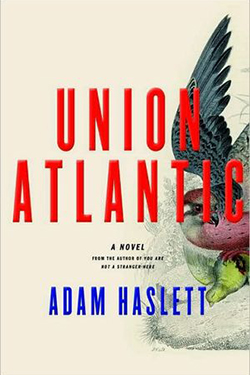Union Atlantic
by Adam Haslett
reviewed by Greg Harris
In a 1989 essay titled “Stalking the Billion-Footed Beast,” Tom Wolfe famously issued a challenge to fiction writers: capture the big dimensions of contemporary life, or watch “history… record that journalists not only took over the richness of American life as their domain but also seized the high ground of literature itself.” Along comes Adam Haslett’s new novel Union Atlantic, which opens big and goes bigger in a virtuosic display of exactly the quality in fiction that Wolfe concedes journalism can’t equal: bringing together the “many currents” of modern life into the “economy…of a single, fairly simple story.”
We first meet Doug Fanning as a U.S. naval officer whose scared, self-interested decisions help cause an international tragedy: the shooting down of a civilian Iranian aircraft. Bodies rain down into the Persian Gulf. Two chapters later, Fanning has moved on to a high-flying Boston investment firm, the eponymous Union Atlantic. We catch him in the middle of a rapacious side deal to build his own personal mansion. And we know—in part, because the meltdown this fictional scenario foreshadows has already happened in real life—that a lot more civilians will be suffering the tragic results of Fanning’s flaws.
These opening chapters promise a novel as exciting as any has been in years, one that seems poised to live up, for once, to the hype stamped on the cover. “The first great novel of the new century,” Esquire (which also published Wolfe’s essay) gushes. “It’s big and ambitious, like novels used to be.”
Haslett doubles, then triples, the novel’s scope by introducing a brother-sister pair who guard the old money that Fanning’s hubris threatens. Henry Graves, the chair of the New York Federal Reserve, is a humane and responsible keeper of the vaults of gold and credit that earn America the world’s confidence. Charlotte, occupant of the ancestral estate in Alden (a thinly veiled Concord, Mass.), is, despite her growing madness, a creditable philosopher and historian. Her internal musings, expressed in imaginary dialogues with her dogs, cast what would otherwise seem a simple real estate grab as a referendum on America in the twenty-first century.
Even as Haslett lays out this grand plot, he retains the extraordinary lyricism and tenderness that made his first book, the far more intimately scaled short story collection You Are Not a Stranger Here, so beautiful and psychologically piercing. Henry is given a quality of soul (not least in his love for his sister) that actual principals of the New York Fed only wish they could project. Nate, a drugged-out teen who, in masochistic fashion, falls in love with Fanning, strips himself of clothes and dignity but is never allowed to shed his worth. Poor, mad Charlotte is granted not just the best zingers in the book (“The news…never mentioned the eyes of the wealthy young and the violence simmering numbly there”), but the explicit consolations of philosophy, “leaps of incandescence…the rhythms of words singing off a page.”
It is disappointing, then, that just as Union Atlantic seems poised to conquer the very territory Tom Wolfe marked out for himself in The Bonfire of Vanities—financial industry greed—it falters, diminishing itself by losing track of its big story and dragging its feet through realms one suspects Haslett finds more comfortable: scenes of adolescent life and real estate conflict in Alden, of cocktail parties and Charlotte’s relationship to her dogs, the emotional damage of missing fathers and drunkard mothers. Among the scenes meant to bring a sense of closure is that of Nate, the least of the characters, gaining a truer love interest. Meanwhile, Doug Fanning slips out of focus and almost out of frame, returning at the end for a cameo as a Blackwater-style stateless mercenary. It’s as if the magic by which the novel opened a window onto the world has gone through an inversion, and the world-shaking events register only as minor tremors of character psychology.
At one point in the novel, Haslett tells a kind of inside joke on himself and other writers of a generation, where the main cultural story seemed to be the rise of the new financial industry titans. Fanning smugly reflects about his secretary, an MFA holder, that she suffers “the inherent powerlessness of a person with an advanced degree in short fiction,” who had “bargained on receiving a certain cultural cachet that had yet to materialize and in the meantime needed a bridge loan of prestige.”
Haslett’s novel shows why cultural cachet is within the reach of such people, and why they aren’t inherently powerless at all. In some achingly ambitious and fulfilling sections, Union Atlantic compasses a world larger than the engines of wealth creation, larger—because it comprehends the heart as well as the headlines—than history itself. If Haslett ultimately fails to sustain the promise of such power—if he, in the end, succumbs to some of an MFA’s bag of smaller craft tricks—one can only hope that this is a step in the direction of the next novel and the next. A bridge loan, as it were, for the coming mastery of a writer worth reading, and watching, as he grows into the greatness with which his blurbs prematurely credit him—but which, I believe, they accurately predict.
Published on June 21, 2013

